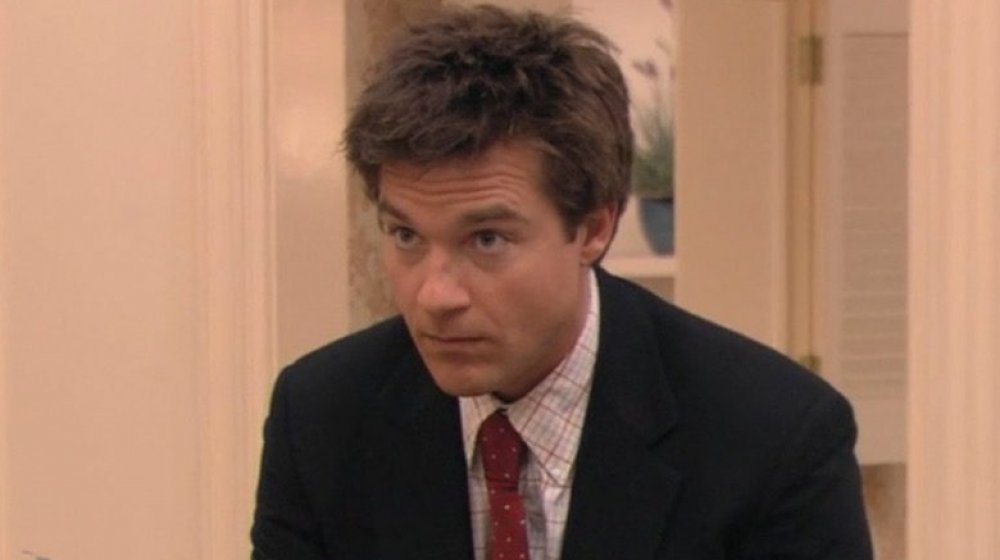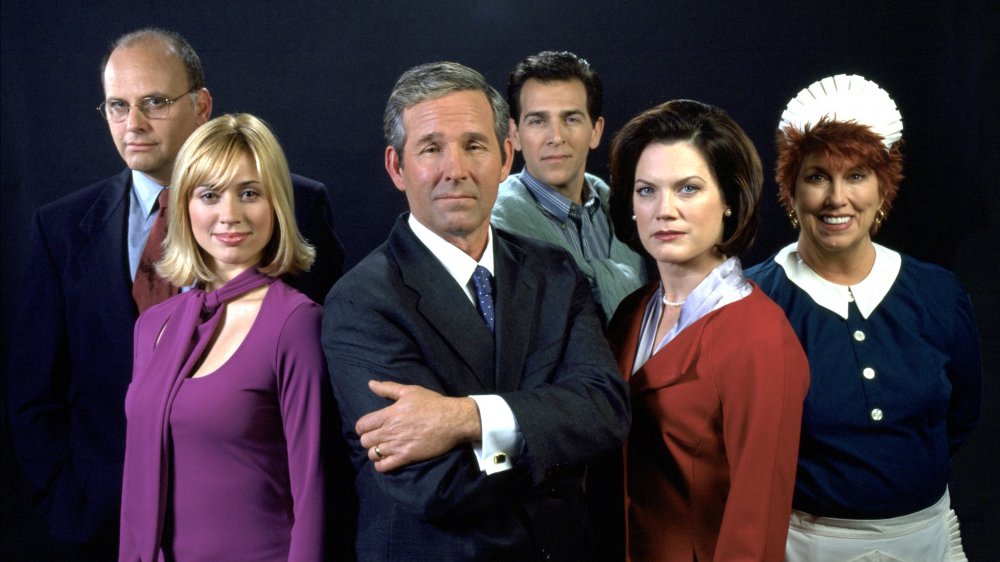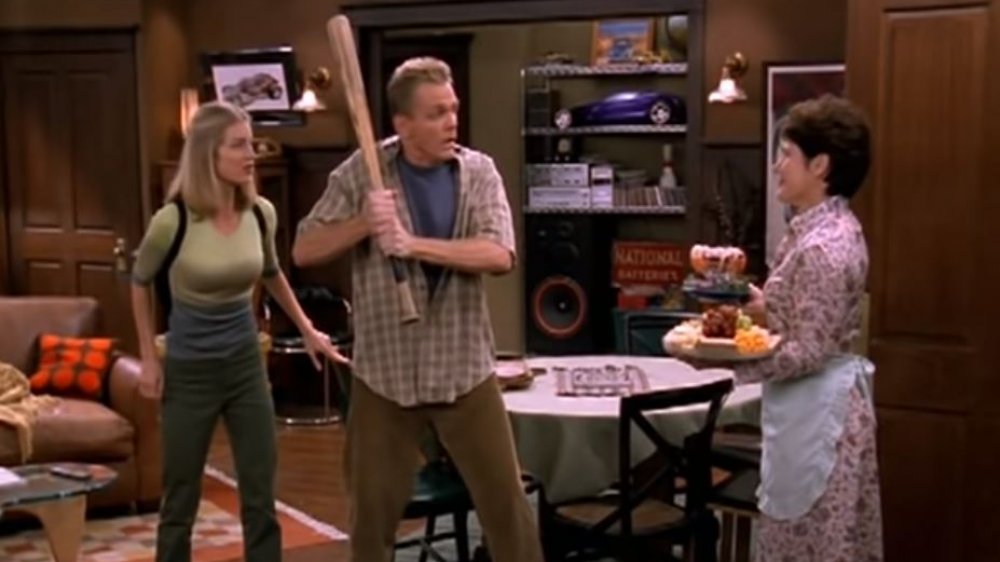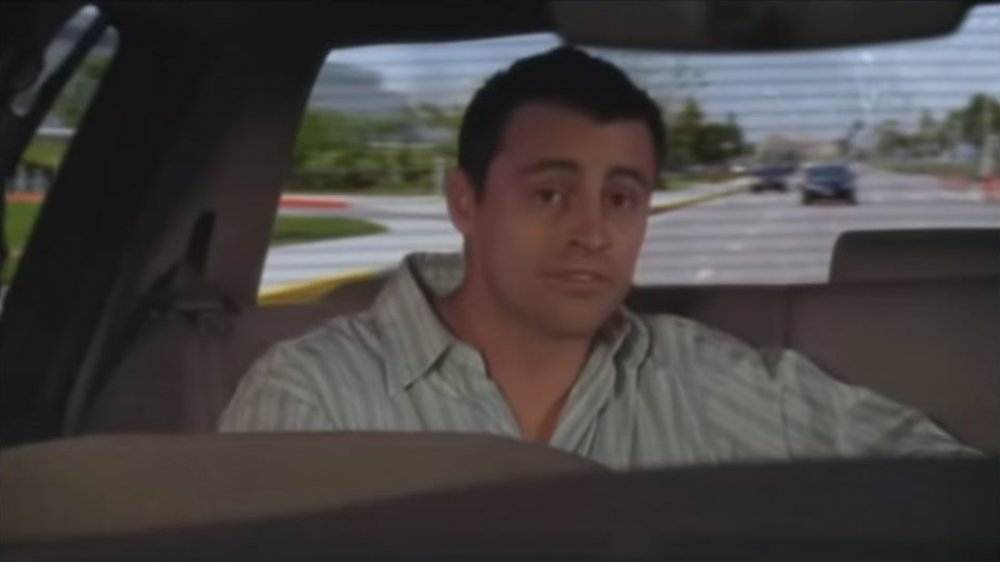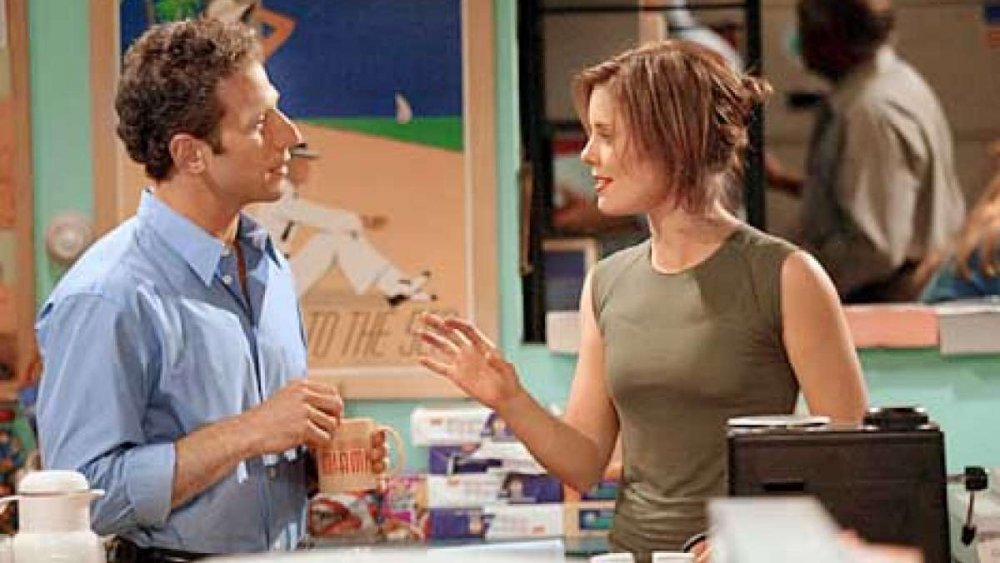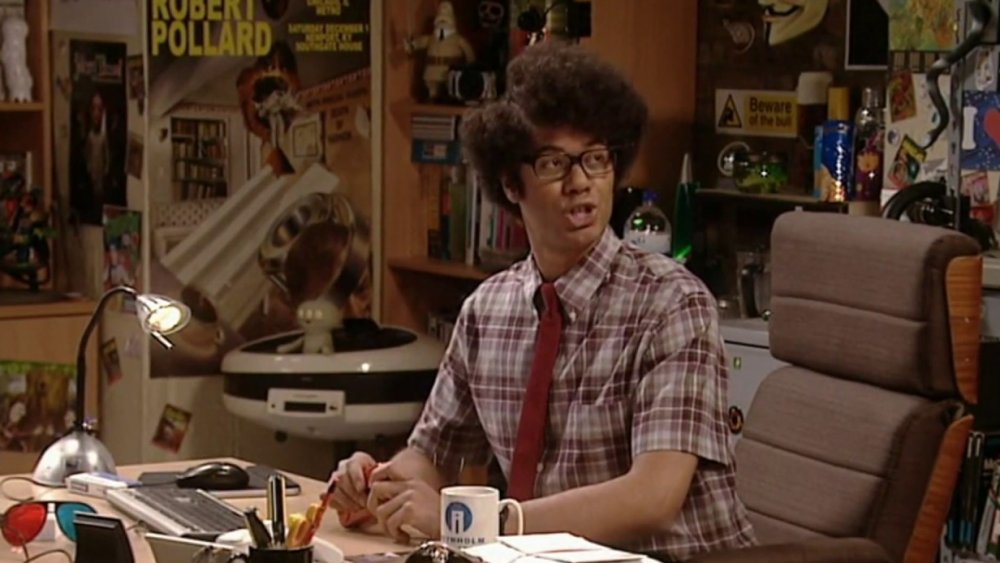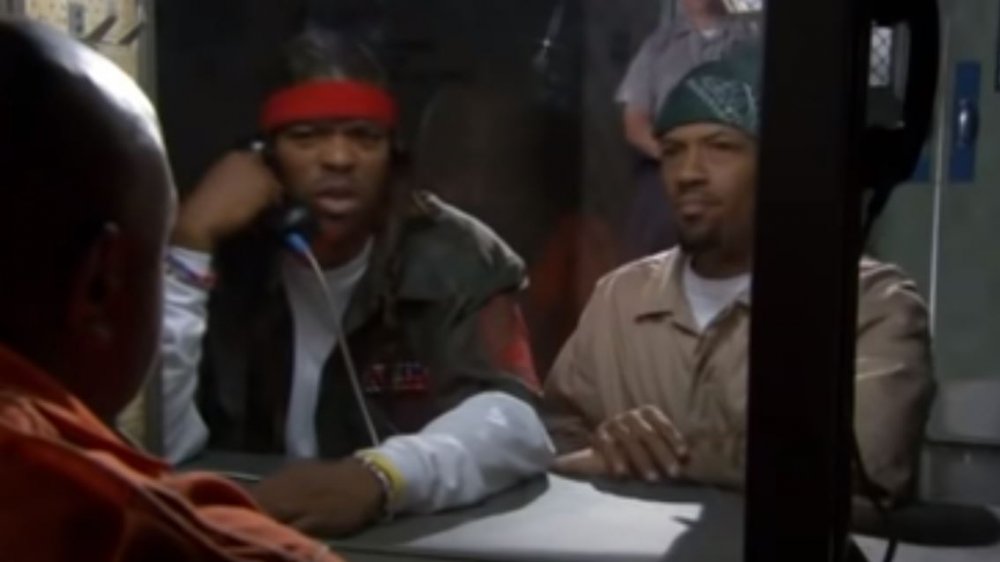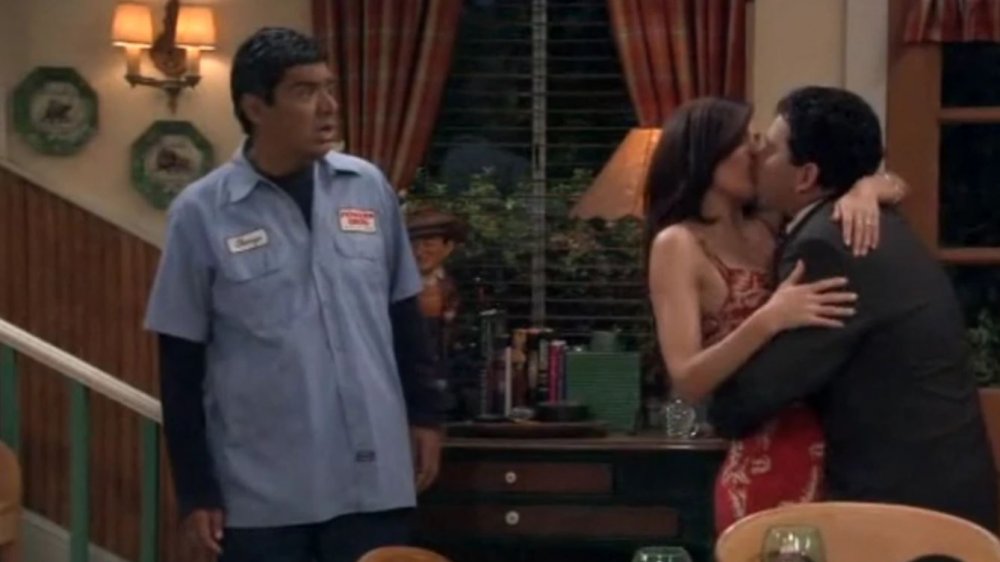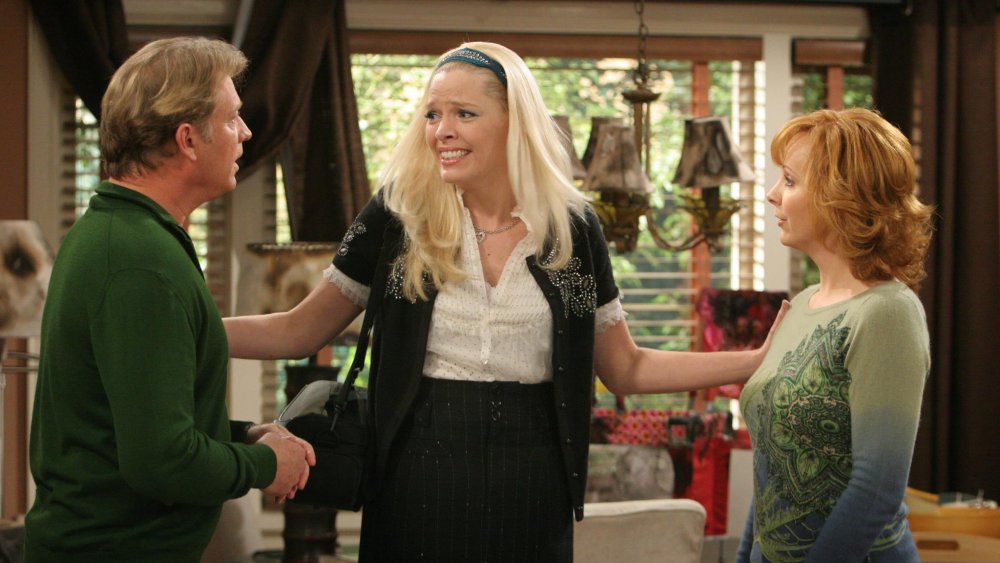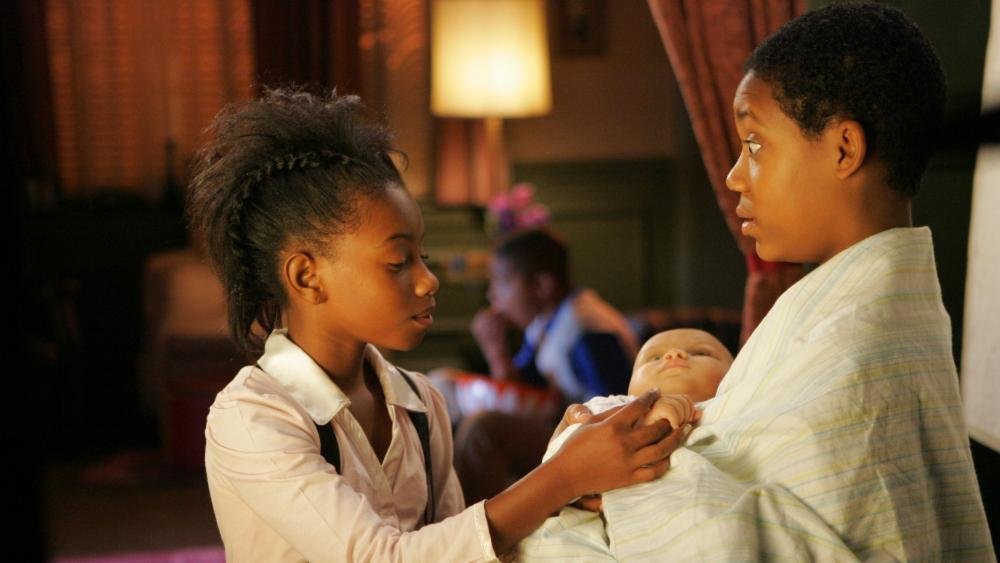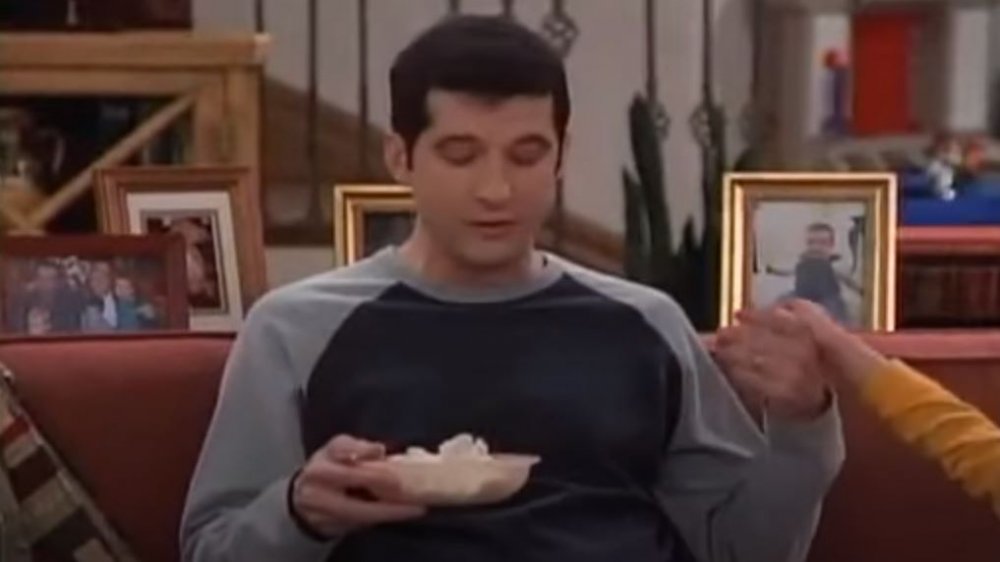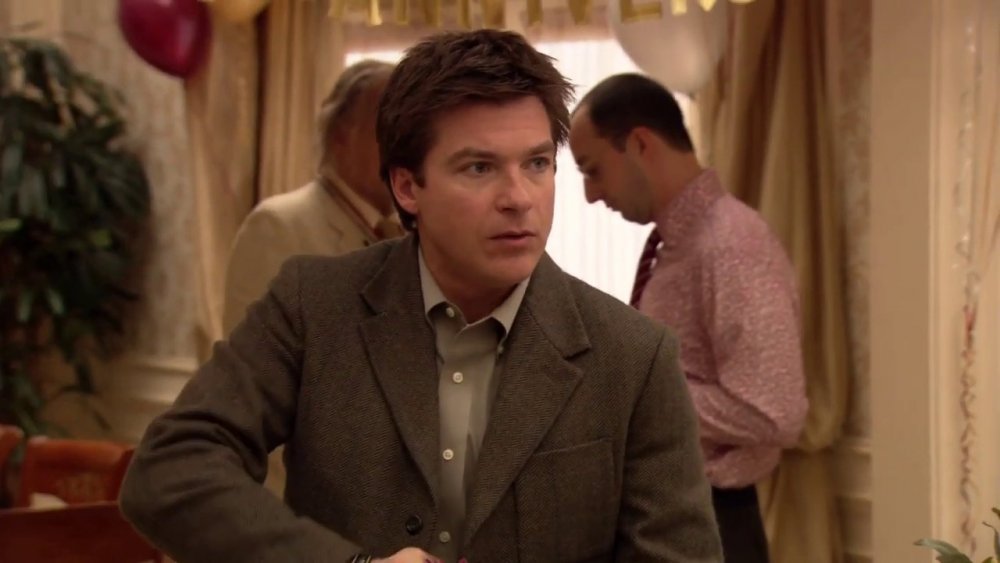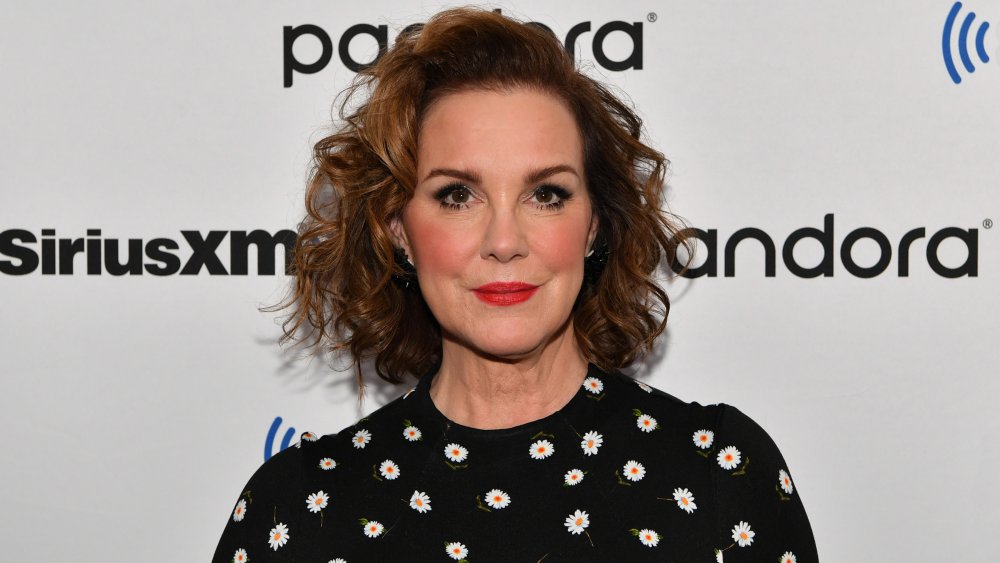The Real Reason These '00s Sitcoms Were Canceled
The 2000s was a strange time for sitcoms. It was a strange time for the world, in fact, but television was undergoing slow but massive changes.
For example, the decade was the tail end of an era when sitcoms were largely about stand-up comics making the leap to a steady paycheck, and it was also the rise of ensembles instead of one or two big stars. Plus, production costs were rising, as was the price of just about everything in the world. Episodic shows were getting phased out in favor of a more serialized style. Nielsen ratings weren't as reliable with the rise of TiVo, VOD, and DVDs. Laugh tracks and live audiences were fading away in favor of single-camera and documentary style shows.
And in the mix were many sitcoms that didn't survive, and these shows were canceled for all sorts of crazy reasons. From forgotten duds to cult classics, here's why these '00s sitcoms you know and, well, maybe don't love but vaguely remember got canceled.
That's My Bush! was way too expensive
Riding off the success of South Park in 2000, Trey Parker and Matt Stone planned to make a sitcom based around whoever won the 2000 presidential election. The recount delayed production long enough to change it from what could've basically been Everybody Loves Al to That's My Bush — one of Parker and Stone's best projects.
Starring Timothy Bottoms as George W. Bush and featuring a cast of characters ranging from Karl Rove to the White House's wacky neighbor, That's My Bush was more about laughs than the actual West Wing inhabitants. Each episode took a political idea and combined it with a sitcom cliche. "An Aborted Dinner Date," for example, has Bush host a summit between pro-life and pro-choice leaders while attending a date with Laura at the same time.
That's My Bush was canceled in August 2001 after an eight-episode season because of high production costs. It was a ratings success, but it cost around $1 million per episode — too high for Comedy Central in the early 2000s. For perspective, even though That's My Bush and South Park had similar viewership, South Park cost half as much to make.
Shortly after cancellation, Parker and Stone announced a spinoff film, George W. Bush and the Secret of the Glass Tiger. The plan was for a John Woo-style action comedy where Bush would foil a Chinese invasion. Any and all plans for this fell apart after 9/11. Both Parker and Stone acknowledge they made the show in the exact window for it.
Titus was canceled after its star put up a fight
Titus was one of the most innovative and popular sitcoms of the early 2000s. Starring comedian Christopher Titus, he played a character loosely based on himself as part of a highly dysfunctional family. The show made use of flashbacks and Titus himself narrating the show from a black-and-white "neutral space" to develop characters and move the story forward. It was a popular show, one that often ends up on "canceled too soon" lists. By Titus' telling, it was entirely his fault that it was canceled.
During a meeting with Fox management, the network president told Titus to break up Christopher and his girlfriend, Erin, due to infidelity. She cited Dharma & Greg splitting up the titular characters and getting a ratings boost as an example as to why Titus should follow suit. And that's when Titus stood up and declared, "Do you even watch the show?" He then explained in detail how the point of his show was that two messed-up people could be a great couple. He knew such a storyline would make the audience turn on the characters ... and that's when "the room got chilly." Titus later said this response "cost [him] $30 million."
The next day, Titus found out that all promos for his show had stopped. The network then spent six months shifting time slots, first putting Titus against The West Wing before dropping it in the Friday night death slot. Even then, the ratings were still decent, but the show wasn't renewed for another season. Titus says the big lesson here is "if you tell your boss he's stupid long enough, he will fire you."
Joey didn't seem like himself at all
Joey wasn't even the second choice for a Friends spinoff, much less the first. Producers originally wanted a Rachel spinoff, but Jennifer Aniston turned them down to make movies. A Monica and Chandler series was proposed next, but the actors didn't want to reprise the roles. Matt LeBlanc, however, was still interested in playing Joey. Thus, Friends had a spinoff to replace it.
NBC was high on Joey, promoting it heavily and giving it the old Friends time slot. The first season started with huge ratings ... which slowly declined after people realized this show was decidedly not good. It was canceled midway through season two, and it never became the new Frasier they'd all hoped for. When asked why it was so bad and got canceled, most people involved have the same answer — the producers, the studio, and the network all got involved and altered the character of Joey.
Producer Kevin Bright told The Age that Joey was a goofy womanizer on Friends but "a solid friend." Meanwhile, on his own show, Bright explained that, "Joey was deconstructed to be a guy who couldn't get a job, couldn't ask a girl out. He became a pathetic, mopey character. I felt he was moving in the wrong direction, but I was not heard." He also noted that the ratings were pretty solid, especially by modern standards, but the expectations were far higher given Friends.
LeBlanc himself said the storylines "emasculated" Joey, turning him into a pathetic friendless loser instead of a "consummate optimist." LeBlanc lobbied for Friends creator David Crane to run the show, but Crane turned it down. Later on, LeBlanc realized that moving forward without Crane was a huge mistake.
Good Morning, Miami was canceled thanks to behind-the-scenes drama
Good Morning, Miami was a sitcom about a low-rated morning show in Florida. It holds the distinction of being one of the first NBC shows broadcast in HD and ... well, few other distinctions. Sure, ratings were below expectations for its "Must See TV" time slot. Sure, reviews weren't positive. But the show was produced by David Kohan and Max Mutchnick, who made Will & Grace. As long as they were around, NBC wasn't going to cancel a show by their biggest hitmakers ... right? Well, funny story about that.
In December 2003, Kohan and Mutchnick sued NBC. The suit claimed NBC didn't negotiate Will & Grace's license fee in good faith, effectively selling the show to itself for millions less than it would've gotten on the open market. NBC countersued, which started a messy legal battle that was finally resolved in 2007. In between those events, back around February 2004, Good Morning, Miami had production shut down and was taken off the air until after sweeps. Without a champion at NBC and with its creators causing problems for the network, the show got canceled. And when it did come back, it returned as a zombie and was outright canceled before the last few episodes could even air in America.
The IT Crowd was canceled thanks to its creator
The IT Crowd followed the lives of three IT specialists at a large company, toiling away in the basement and causing problems for each other. It ran for four seasons and 24 episodes over the mid-to-late aughts, and it was a hit among fans of British comedy. The show was the brainchild of showrunner turned professional transphobe Graham Linehan, and back in the day, it was going to run as long as he wanted.
A fifth season was ordered, but during a Reddit AMA in October 2011, Linehan announced he was ending the show after four seasons. As he explained, "[The] chief reason was the fact that I just wasn't looking forward to it the way I used to," and he wanted to end on a high note. The characters, he figured, developed enough that it would be weird to keep them in the basement, and he didn't want to add any plot contrivances to keep things going, saying, "I don't want to start giving everybody babies to make it feel like they're moving on with their lives." A special final episode was broadcast in 2013.
The stars of Method & Red weren't happy with the series
Method & Red was a sitcom about the titular rappers moving to the suburbs and trying to fit in with the upscale white residents. Method Man and Redman played variations of themselves on the show in a hip-hop fish out of water story. It even had the 9:30 PM time slot on Fox, which carried it for a while. Alas, the show was yanked from air because of a combination of misreading the audience, bad creative decisions, and public feuds with the talent.
Warning signs flashed early when Meth said he didn't like the title, given that it boxed them in as stars. The first episode got solid ratings, but some bad reviews and frustrations with the network boiled over in an LA Times interview. Meth made it clear that he wanted the show to be more streetwise, but Fox had other ideas. He said, "There's been too much compromise on our side and not enough on their side. I want more ghetto stuff, but all they care about are the people who have the Nielsen boxes." He wanted to be "both ghetto and intelligent," but it wasn't clicking. He also despised the laugh track, saying, "This show doesn't need it, and I had no idea they were going to put one in."
Stories continued to spread about strife on set, which Meth later called exaggerations, but the end result was the same. The show was put on hiatus with four episodes left to air. Months later, Meth said, "I appreciate Fox for giving us the opportunity to do it, it just wasn't a good marriage. We had to divorce." He said that Fox alienated the audience Method & Red brought, with the network thinking they'd broaden appeal with wacky storylines instead of push away existing fans. "It just wasn't for me and Redman. If Keenan and Kel was on there, it would've been funny."
George Lopez wasn't pleased his '00s sitcom was kicked off the air
Mexican-American comedian George Lopez's eponymous show ran for six seasons on ABC. It followed a fictionalized version of himself working a blue color job and supporting his family. And he often factored his own life into the show. For example, when the real Lopez had a kidney replaced, Lopez's son on the show had a kidney issue that required surgery. Real Lopez's abandonment issues with his family also played into the series when the fictionalized Lopez found out his father was alive. However, the series was eventually canceled for reasons that didn't sit well with Lopez.
ABC told Lopez that his show would lose money if the network picked it up for another season. Production costs are a common reason behind cancellation, and it might explain why two new shows that got worse ratings were renewed instead, but there's more to it here than just salaries. Lopez partially blamed it on the show being produced by Warner Brothers TV instead of in-house by ABC Studios. He also suggested a lack of support from the network, given that it kept changing time slots and going against American Idol. Lopez was especially irked that one of the shows that replaced him was that awful Geico cavemen sitcom, asking, "So a Chicano can't be on TV, but a caveman can?"
Reba didn't have the right audience
Reba starred country music star Reba McEntire as a single mom of three kids living in the Houston suburbs. The show was a big hit for The WB in the network's waning years, and it came with the built-in audience of country music fans. It lasted for six seasons, but the sitcom was ultimately canceled due to a new network having new goals.
The show was briefly canceled after The WB merged into The CW before getting revived at the last minute. It was the highest-rated comedy on The CW, but TV isn't just about the most viewers — it's about the right viewers. The fledgling network didn't think Reba's country fans matched the demographics they were looking for, and thus, it canceled the show once and for all.
Years later, 20th Century Fox president Gary Newman expressed regret for how the network handled Reba. "The WB didn't really know how to communicate with advertisers or expand their audience to make it work," he told Variety. "I'm convinced that it could have been a big hit on CBS or ABC."
Everybody Hates Chris matched up with Chris Rock's real life
Everybody Hates Chris was based on comedian Chris Rock's teenage years, complete with Rock narrating the show. The show was a hit for UPN and later The CW, and it even picked up a Golden Globe nomination. All four seasons were successful, albeit with some ratings decline towards the end. The show wasn't picked up for a fifth season, but Rock and company weren't planning on one. They had an ending ready to go because the show matched up to Rock's real-life timeline.
Terry Crews, who played Rock's father in the show, noted that Rock himself didn't become a comedian until he was 17. "Our Chris," Crews said in reference to the character (via Hollywood.com), "is now a sophomore in high school, so the timing is lining up pretty well. Once he becomes a comedian, the show's over."
The show's final scene — in a parody of the Sopranos finale — sees the Rock family in a diner, jamming out to '80s rock, waiting to Chris's result on the GED ... only to cut to black.
Yes, Dear was canceled after one of its stars walked away
Yes, Dear was about two families with two wildly different parenting philosophies living on the same property. It was lowbrow, not particularly sophisticated, but it popped a solid rating early on. The gulf between the show's awful reviews and solid-enough fan base was puzzling to many, but star Anthony Clark said he never cared what critics thought. In his own words after the series ended, "I've got a house in Laguna Beach and one in the Hollywood Hills." And CBS Entertainment president Nancy Tellem said that there was a "huge difference between the critics and mainstream America."
The show was almost canceled after season four but came back for a fifth season after new negotiations with CBS. However, the show was canceled once and for all at the end of the sixth season. The cause? NBC hired Clark to host Last Comic Standing. With one of their four principal actors gone, CBS saw no reason to continue. Co-creator Greg Garcia went on to create My Name Is Earl. Critics celebrated.
Arrested Development is the most famous canceled sitcom of the '00s
Before becoming the poster child for sitcom revivals, Arrested Development was the poster child for underrated sitcoms that got more acclaim than viewership, and there's a whole, well-documented mess of reasons why Arrested Development was canceled the first time around (before the Netflix seasons). For example, ratings were low, particularly as a result of stiff competition and a lack of promotion. Plus, Nielsen didn't know how know how to factor in DVR viewership at the time, so the show was hampered with only first-run ratings.
But there's another aspect to the story that's not as well-known. Showrunner Mitch Hurwitz was actively shopping the show around to other networks, and he came close to landing a deal. Several episodes made oblique references to Showtime because the network was a contender to pick it up, and a deal was almost struck. The problem was that Arrested Development's lack of success also gave it a lack of leverage. "The Showtime offer," says Hurwitz, "as it was presented to me, was half the money for half the show." Hurwtiz had no interest in doing what in his estimation was a lesser show, so he walked away and said, "Arrested Development reached its end, creatively, as a series." Showtime later realized that they made a huge mistake.
Battery Park was defeated by a game show
Battery Park starred Elizabeth Perkins as a police captain at a precinct in, you guessed it, Battery Park, who set her sights on a higher office. It also featured Bokeem Woodbine in a prominent role a full 15 years before his breakout role in season two of Fargo. The show was cancelled after only four episodes. Awful ratings were the reason, but they were awful in a strange way and for a historic reason.
NBC put Battery Park in the middle of its Thursday night "Must See TV" lineup at 9:30 PM, right between Frasier and ER. This slot alone kept shows like Veronica's Closet and Suddenly Susan alive despite critical beatings and audience apathy. Battery Park, meanwhile, lost 30% of the audience who were watching Frasier just a few minutes earlier.
The biggest reason for such a drop-off? ABC was airing a game show by the name of Who Wants to Be a Millionaire? in the same time slot. Millionaire was the biggest hit on television that era. It ran in primetime almost every day of the week. It regularly drew 17 million viewers, and several episodes would often stack for the top rated programs that week. Unable to compete, Battery Park was canned and was replaced by more Frasier reruns.
